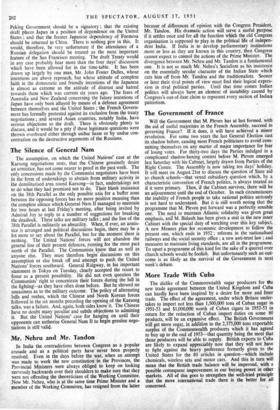Mr. Nehru- and Mr. Tandon
In India the contradictions between Congress as a popular crusade and as a political party have never been properly resolved. Even in the days before the war, when an attempt was made to work the new constitution in the Provinces, the Provincial Ministers were always obliged to keep on looking nervously backwards over their shoulders to make sure that they were not offending the theoreticians of the Working Committee. Now Mr. Nehru, who is at the same time Prime Minister and a member of the Working Committee, has resigned from the latter because of differences of opinion with the Congress President, Mr. Tandon. His dramatic action will serve a useful purpose if it settles once and for all the function which the old Congress organisation is supposed to play in the political life of indepen- dent India. -If India is to develop parliamentary institutions .more or less as they are known in this country, then Congress cannot expect to control the actions of the Prime Minister. The divergence between Mr. Nehru and Mr. Tandon is a fundamental one. It is not so much Mr. Nehru's Socialism as his insistence on the essentially secular character of the Indian State which cuts him off from Mr. Tandon and the traditionalists. Sooner or later their rival points of view must find their logical expres- sion in rival political parties. Until that time comes Indian politics will always have an element of instability caused by Congress's out-of-date claim to represent every section of Indian patriotism.






























 Previous page
Previous page